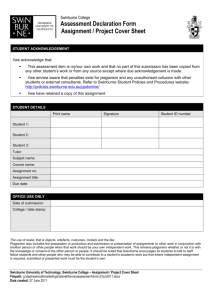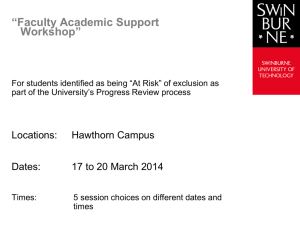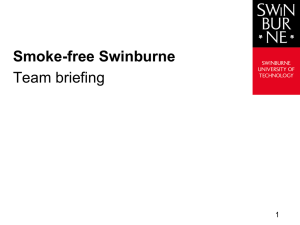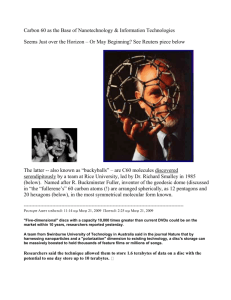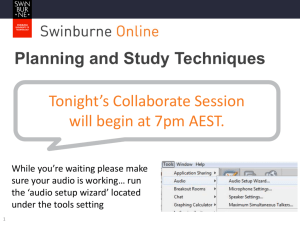Presentation slides - Swinburne University of Technology
advertisement
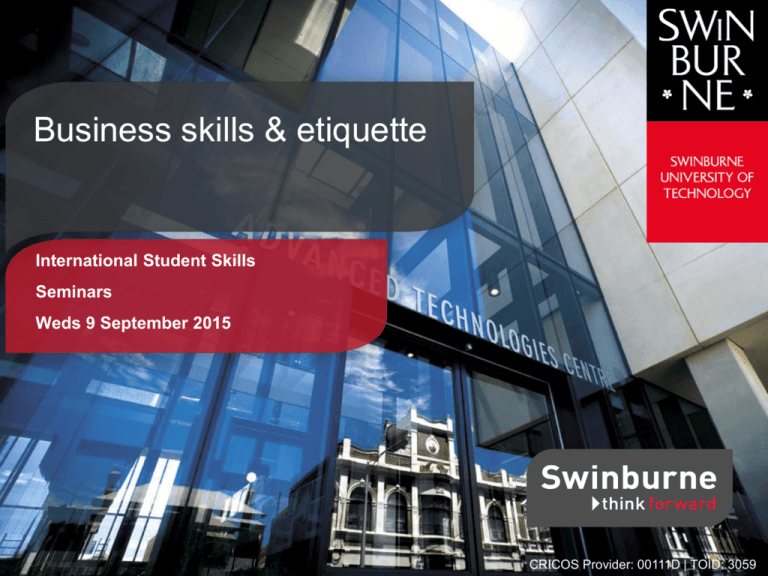
Business skills & etiquette International Student Skills Seminars Weds 9 September 2015 CRICOS Provider: 00111D | TOID: 3059 Swinburne Presenter: Olivia Doyle International Student Advisor - Employability International Student Life Tel 9214 8248 Email odoyle@swin.edu.au 2 International Student Life: Employability support Swinburne Specialist support for international students aiming to work in partnership with you to develop your employability Provide professional insights and guidance Connect you with programs, events and activities to advance your professional career internationally and in Australia Employability road map – a professional development guide for each stage of your Swinburne student life cycle More details: www.swinburne.edu.au/student/international/employability 3 International Student Life Employability Swinburne Monthly Employability News Regular program of employability seminars Skill seminars Student appointments Connections Networking events Cross cultural events 4 International Student Job Club Swinburne If you are looking for a part time / casual job or professional employment, join our Job Club to get support, share ideas and network Come along to our informal fortnightly meetings to: Find out who is hiring & share job leads Get advice on job search strategies Update your job search tool kit Learn about Swinburne support services Hear from guest speakers Support each other 5 Swinburne Semester 2 Job Club Dates 1.30 – 2.30 pm Thursday 10 September in BA602 12.30 – 1.30 pm Thursday 24 September in BA605 11.30 - 12.30 pm Tuesday 6 October in BA605 11.30 – 12.30 pm Monday 19 October in BA602 12.30 – 1.30 pm Thursday 5 November in BA606 11.30 – 12.30 pm Tuesday 24 November in BA602 No need to register – just come along Dates are also on website 6 Agenda Swinburne Distinctive features of Australian business culture / etiquette Hierarchy & leadership styles Expectations of employees Communication styles Business dress Networking etiquette Dining etiquette – the basics 7 Swinburne Why focus on Australian workplace culture, skills & etiquette? Globalisation has seen increased recognition of the importance of understanding links between culture and business success Your increased understanding will assist you with: • Transition into the Australian workplace • Development of strategies to improve your effectiveness in the workplace • Improving your employment prospects 8 Employment challenges facing people from multicultural backgrounds can include: Swinburne Understanding of Australian workplace culture Communication skills – verbal & written Limited Australian contacts and networks Visa restrictions Understanding Australian job search techniques Lack of local work experience Perception of returning home 9 Swinburne What is culture? The way we do things around here What we consider normal Core values and beliefs It is dynamic and changing What is business culture? Business etiquette Organisational culture Policies and procedures Value and patterns of behaviour Ethics 10 Swinburne Discussion What are some distinctive aspects of AUSTRALIAN social & business culture /etiquette? What are some distinctive aspects of other countries social & business culture / etiquette? 11 Swinburne Cultural differences - Less obvious hierarchy International / Asian Culture - Appearance of friendly / relaxed - - Time – meeting deadlines More hierarchy – respect for managers/seniors – juniors keep quiet - Value initiative - Less female equality? - Team focussed - More individually focussed - Multicultural - Time is more elastic - Workplace rights and laws - More community spirit - Strong OHS emphasis - B2B relations have interpersonal focus - Focus on policies & procedures - Don’t like to say no - Interest in environmental issues - Concept of guanxi - Work / life balance – in some orgzns. - More community spirit o/s - Coffee - Others? - Sport / BBQs / holiday focussed - Others? Australian Culture 12 Swinburne - Australia is one of the world’s most integrated multicultural societies - Australians are generally interested and accepting of other cultures - No two Australians are exactly the same despite being raised in the same national, local, and, in the case of siblings, family cultures – there is always individual variations - This also applies in business settings 13 Swinburne Understanding culture in the work place is vital! Problems and misunderstandings often stem from not understanding the culture or “the way things are done around here” “We have a lot of international students in the workplace. Their technical skills are first class. But I often find I have to go around and fix up problems caused by differences in communication or lack of cultural understanding.” Senior Health Worker Victorian Hospital 14 International student cultural issues Swinburne - Punctuality - Written communication (emails, letters, reports) - Unprofessional style - Inappropriate style – too demanding - Oral communication - Clarity - Too demanding / too quiet - Too formal / too informal - Not joining in e.g. office chat 15 Swinburne International student cultural issues - Attitudes towards female colleagues and managers - Initiative – don’t wait to be told - Skills - MS Office – esp. Excel - IT technical - Personal presentation - Personal space 16 Swinburne The Australian workplace – we are different! “I often see Australian employees taking the time to talk to the security guard, the cleaner and the tea lady, much more than you would in my country! Even top management will make sure they ask about families and get involved if there is an issue.” Dinesh Indian Student 17 Swinburne The Australian workplace – we are different! “At my work there is a lot of joking and laughter, which I find to be quite disruptive. But I realise the other staff members don’t think it’s a problem, so I have had to change my thinking a bit.” Faye Lee Malaysian Migrant 18 Swinburne The Australian workplace – we are different! “I was raised in India where it was unacceptable to question the directions of someone more senior. It was normal to follow directions without question. It’s very different here.” Nitesh Indian Migrant 19 Swinburne The Australian workplace – we are different! “My manager asked me to get the quarterly sales figures. I requested them from Mr Lee, General Manager of China operations. My manager said they were not accurate and blamed me for not checking them. I explained it wasn’t my fault as Mr Lee provided the figures – I didn’t want to show lack of respect by questioning his work. My manager said I wasn’t showing any initiative.” Zhang Li Chinese Intern in Australian company 20 Swinburne The Australian workplace – we are different! “I come from South Africa. It’s always ‘Yes Sir’ to the boss. At home people give orders and others accept. …. Australians don’t like anything that sounds like an order. They don’t give them and they certainly don’t take them well. Its not that there isn’t hierarchy in Australia, but it’s less obvious.” Kurt South African Migrant – Now Australian Manager 21 Swinburne Key differences between Australian and other workplaces Hierarchy and leadership styles Expectations of employees Communication styles Equal employment opportunity (EEO) Occupational Health & Safety (OH&S) Focus on policies & procedures 22 Swinburne Leadership styles Flat organisational structures Manager may not have a separate office Don’t call them ‘sir’ or ‘madam’ – generally first names Respect is earned Communications between staff and management are open and direct Managers are usually approachable Managers often share in a joke, join staff for drinks etc 23 Swinburne Expectations of employees Australians love initiative! Managers expect you to be able to work out for yourself what needs to be done, if not – ask! New ideas and creativity are encouraged Issues or problems are dealt with directly Show flexibility / can multi-task Team player but can also work independently Show enthusiasm and are self-motivated Have appropriate skills for the job 24 Swinburne Expectations of employees Australian Government has identified 8 key employability skills: Communication Teamwork Problem Solving Initiative and Enterprise Planning and Organising Self-management Learning Technology 25 Communication Swinburne Casual and informal speech in the workplace is common – eg greetings are casual and relaxed Direct communication style – appreciate brevity and not too much detail Written communication still needs to be professional and formal (careful with your emails!) Managers often ask staff for their input instead of telling them what to do Humour is important Tend to get down to business quickly with minimum small talk Don’t like high pressure sales techniques – like facts & figures and a winwin approach 26 Swinburne Workplace communication tips Value sincerity and authenticity – don’t like pretentiousness / showing off Try to be polite, relaxed and friendly Join in the jokes and laughs Join in social activities – eg Friday drinks (you don’t have to drink alcohol) Talk about what you did on the weekend Aussie Rules football Holidays Cooking Current events Sport Weather Movies / TV Weight loss (women!) Swinburne More workplace communication tips Shake hands when commencing and concluding a meeting Both men and women shake hands Personal space – maintain an arms length distance Eye contact – very important during meetings and interviews Tone and volume of speech - speak slowly, clearly and at a volume where you are clearly heard Smile Improve your communication skills: Swinburne VISIT SWINBURNE’S LAS Do you use the free services provided by Swinburne’s Language and Academic Skills? - Conversation groups - Workshops - Individual and small group support 29 Swinburne Equal employment opportunity - Men and women are treated equally - Australia has laws protecting all people from discrimination and harassment in relation to: Race Religion Political beliefs Sexual preference Age Disability Gender Carer or parental status Physical features 30 Swinburne Be aware of your own behaviour and your rights Discrimination Unfair treatment based on prejudices Sexual harassment Unwanted attention / sexual advances Sexual jokes, offensive phone calls and emails, displays of obscene or pornographic photos, pictures, posters, screen savers and internet sites Making promises or threats in return for sexual favours Victimisation / bullying Repeated, unreasonable behaviour directed toward an employee 31 Swinburne Useful links Fair Work Ombudsman www.fairwork.gov.au Job Watch www.jobwatch.org.au Fair Work Ombudsman ‘You Tube’ videos to understand workplace rights in 14 languages! www.youtube.com/fairworkgovau 32 Australian culture Swinburne Personal presentation Office dress – esp. for job interviews Wear business attire Men – preferably dark business suit and tie Women – business suit (jacket, skirt, pants) or conservative clothes with minor decoration Limited jewellery Take care with personal hygiene, ironed clothes Casual Fridays Appropriate Business Wear - Men Appropriate Women’s Business Wear Swinburne Networking etiquette Networking is a key employability skill – but you must know basic networking etiquette 42 What is networking? Swinburne Networking is an essential career skill Great way to research industry / positions, get introductions and career advice Networking can uncover ‘foot-in-the-door’ opportunities: work experience, casual/part-time, temp employment Demonstrates initiative, drive and a positive attitude Power to market yourself proactively to the job you want 43 Why network? Swinburne University graduates are increasingly finding it difficult to find professional employment Flat job market Credential inflation International competition Chance to get ahead of the crowd – cut down your competition About 70 - 80% of positions are filled without an ad ever reaching the job market 44 Swinburne International students often lack a strong network of contacts to provide industry insights, career tips and employment contacts You need to create your own network 45 Building a professional network Swinburne University Professional association membership Professional events Employment General events / connections On line – including LinkedIn 46 Networking etiquette tips Swinburne Don’t ask for a job – ask for advice Don’t just focus on what your needs & interests – it needs to be a 2 way relationship SCIENCE | TECHNOLOGY | INNOVATION | BUSINESS | DESIGN 47 Networking etiquette tips Swinburne Make a confident introduction. Offer both your first and last name when making an introduction Extend your hand first. A handshake always accompanies a greeting or introduction. (Make sure your handshake is firm and stable.) Show genuine interest and curiosity – build a relationship SCIENCE | TECHNOLOGY | INNOVATION | BUSINESS | DESIGN 48 Swinburne Hold only a glass or a plate of food in your left hand. This allows you to keep your right hand free for the customary handshake. Remember names – repeat them back after the introduction. If you have forgotten you can say ‘Please remind me, your name is …..’ (Wear your name tag) Careful with your sales pitch – don’t overdo it but do have an introductory pitch prepared Prepare some interesting conversation starters Don’t spend the evening catching up with friends. Say hello to those you know, but make it a point to spend most of your evening meeting new people and making new contacts. SCIENCE | TECHNOLOGY | INNOVATION | BUSINESS | DESIGN 49 Swinburne Close the conversation gracefully After you’ve spent approximately 5 minutes visiting with someone new, let them move on so you both can continue to meet other people. Exiting is as easy as extending your hand for a handshake and saying “It’s been nice talking with you” or “Good to meet you, I look forward to talking with you again” When you attend an event focus on trying to meet 5 new people – stretch yourself If you don’t know anyone, look for other people standing on their own and introduce yourself SCIENCE | TECHNOLOGY | INNOVATION | BUSINESS | DESIGN 50 Swinburne Help make connections for other people – introduce them and add in something about their backgrounds or something they may have in common to help get the conversation started Listen actively and ask questions to keep the conversation going Exchange business cards Be genuine / be yourself SCIENCE | TECHNOLOGY | INNOVATION | BUSINESS | DESIGN 51 Swinburne Follow up after the event Join up on LinkedIn Organise further catch up Follow up on any promises / contacts / information Don’t focus on ‘what’s in it for me’! Do not stand in the corner and play on your iphone!! SCIENCE | TECHNOLOGY | INNOVATION | BUSINESS | DESIGN 52 Your professional ‘networking’ pitch (under 30 secs) When networking you need a ‘pitch’ to introduce yourself You need to tailor your pitch to suit the occasion and your goals Eg. job search, business development etc Consider: Who are you meeting? What do you want to learn? What actions do you want to result? What can you contribute? Your professional job search pitch Swinburne Your professional pitch needs to succinctly communicate what you are qualified to do, and what role / industry(ies) you are ideally targeting Suggested structure: Your qualifications / how you want to “professionally market” yourself ie. Degree qualified IT professional, specializing in …… What role (title) / industry(ies) are you targeting, ie. Now targeting a xxxxxxxx role within the xxxxxxx sector … Ideal role function ie. Ideally collating, analyzing data and communication solutions SCIENCE | TECHNOLOGY | INNOVATION | BUSINESS | DESIGN 54 Dining etiquette – the basics Swinburne Table manners play an important part in making a favourable impression. They are visible indicators of your manners and are important to professional success. DO’s Introduce yourself to everyone at the table and help to introduce others Speak to people seated on either side of you Prepare some conversation starters on various topics Eg industry related, sport, travel, study (nothing controversial) Place your serviette on your lap Know which cutlery and glasses to use Turn off your phone SCIENCE | TECHNOLOGY | INNOVATION | BUSINESS | DESIGN 55 Dinner etiquette – the basics Swinburne DO NOTS Speak with your mouth full Start until everyone at your table has been served Wave your cutlery in the air Don’t text Arrive starving Put elbows on the table until after main course SCIENCE | TECHNOLOGY | INNOVATION | BUSINESS | DESIGN 56 Dinner etiquette – reading the table setting SCIENCE | TECHNOLOGY | INNOVATION | BUSINESS | DESIGN Swinburne 57 Swinburne SCIENCE | TECHNOLOGY | INNOVATION | BUSINESS | DESIGN 58 Finished eating SCIENCE | TECHNOLOGY | INNOVATION | BUSINESS | DESIGN Swinburne 59 Strategies for adapting to Australian culture Swinburne Be aware of your own cultural traits and how they differ from Australia You may need to adjust your behaviour when necessary to communicate effectively and achieve your goals Observation is the first step in cultural adaptation – watch what is going on Pay attention to the actions of people who are similar to you in age, gender, social role, job Consider how Australians are reacting to your behaviour – learn from your mistakes Pick up on the cultural principles – the underlying norms, values and beliefs You don’t have to give up your old culture and beliefs to thrive in Australia 60 Centre for Career Developmet Swinburne - Career counselling - Job search assistance - Interview skills - Employer information and on campus presentations - Going Global international job search data base - Career conferences, workshops and webinars - Range of handouts / podcasts: - Interviews Resumes Cover letters LinkedIn profiles - What can I do with my qualification - Networking - Job search - Assessment centres etc SCIENCE | TECHNOLOGY | INNOVATION | BUSINESS | DESIGN 61 Free resume / cover letter / LinkedIn checks Swinburne Drop in to have your documents checked by a Career Practitioner No appointment necessary Hawthorn: Monday – Friday 62
